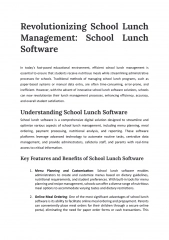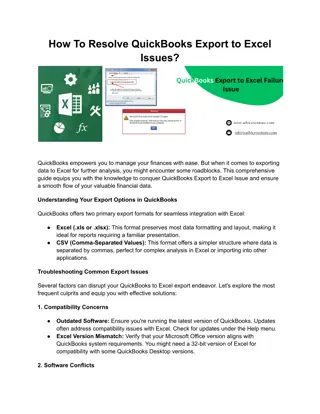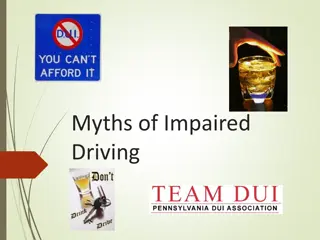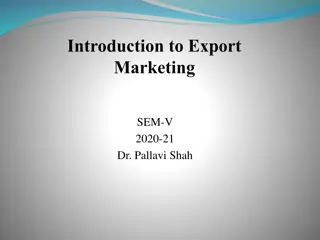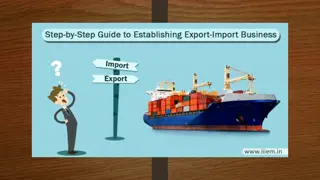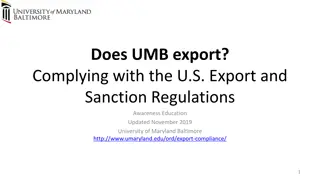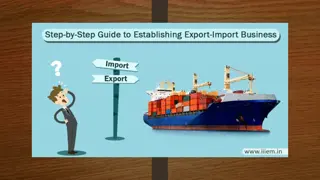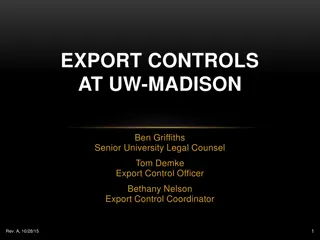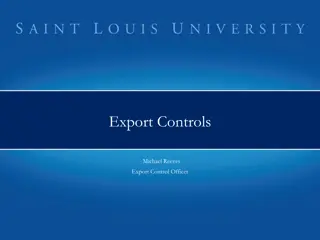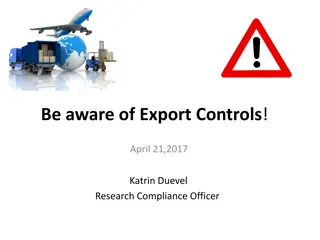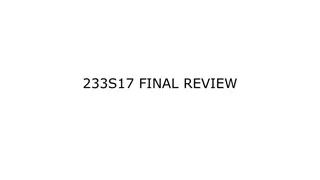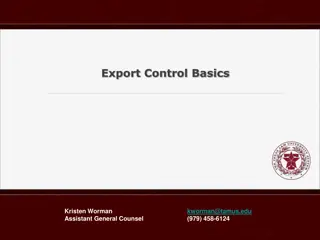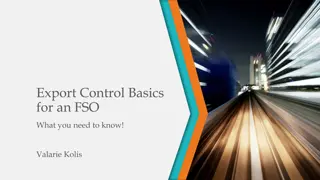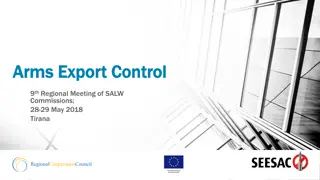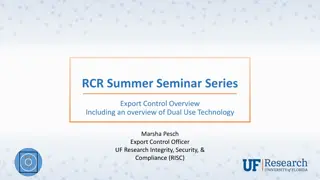
Exploring Export Controls Outside International Shipments
Discover the truths and myths surrounding export controls beyond international shipments. Learn about the wide range of activities that fall under export controls, from collaborating with non-U.S. parties to accessing sensitive data. Understand the implications of restricted parties in compliance with U.S. export laws and regulations.
Download Presentation

Please find below an Image/Link to download the presentation.
The content on the website is provided AS IS for your information and personal use only. It may not be sold, licensed, or shared on other websites without obtaining consent from the author. If you encounter any issues during the download, it is possible that the publisher has removed the file from their server.
You are allowed to download the files provided on this website for personal or commercial use, subject to the condition that they are used lawfully. All files are the property of their respective owners.
The content on the website is provided AS IS for your information and personal use only. It may not be sold, licensed, or shared on other websites without obtaining consent from the author.
E N D
Presentation Transcript
March 25, 2025 UF Compliance and Ethics (UFCE) Learn Over Lunch Series Exploring the Truths and Myths of Export Controls Stacy Beck, JD | Interim Export Control Officer UF Research Integrity, Security & Compliance (RISC)
UF Research Integrity, Security & Compliance Research Security Conflicts of Interest Research Integrity International Engagements & Collaborations Export Controls Undue Foreign Influence State Statute Compliance Outside Activity Prior Approvals Conflicts of Interest Conflicts of Commitment Annual Disclosures State Statute Exemptions Research Misconduct Questionable Research Practices Responsible Conduct of Research Training
Export Control Compliance U.S.Department of CommerceBureauof Industry and Security Export AdministrationRegulations(EAR)Controls commercial, dual- use, and less sensitive military items Controlleditems are either describedontheCommerceControlList (CCL)ordesignated EAR99 U.S.Department of State Directorate of Defense TradeControls InternationalTraffic inArms Regulations(ITAR)Controls military items Controlleditems are describedonthe U.S.MunitionsList (USML) U.S.Department of the Treasury Office of ForeignAssets Control Administers and enforces economic and trade sanctions Comprehensively Sanctioned: Cuba, Iran, North Korea, Syria, Ukraine regions* Other agencies also have a role in limited circumstances,e.g., NRC,NOAA,DOE.
Q: Truth or Myth? Export controls are only about international shipments. 4
Export controls cover a wide range of activities, including but not limited to: Shipping or hand-carrying items abroad Traveling abroad Collaborating with a non-U.S. party within the U.S. or abroad Accessing or developing certain kinds of data, items, or technology Conducting certain kinds of activities that may trigger U.S. sanctions or other U.S. export control laws and regulations based on country, party, and/or subject matter A: Myth 5
Q: Truth or Myth? I can collaborate with any party in the world as long as no funds are exchanged. 6
Restricted Parties Each U.S. Government agency with oversight for export controls administers various lists of restricted (or denied) parties. The lists include individuals, organizations, or companies that the federal agency has identified as a party the U.S. may not be able to conduct certain transactions with, such as exporting, investments, or, in some cases, any transaction. The University will not enter into contracts or other agreements, do business with, or engage in any activity with entities on a U.S. government restricted party list without the prior written approval of the Export Control Officer. https://research.ufl.edu/compliance/research-security/export-controls/restricted-parties.html A: Myth 7
Florida Statutes 288.860, F.S. defines Foreign country of concern as follows: Foreign country of concern means the People s Republic of China, the Russian Federation, the Islamic Republic of Iran, the Democratic People s Republic of Korea, the Republic of Cuba, the Venezuelan regime of Nicol s Maduro, or the Syrian Arab Republic, including any agency of or any other entity under significant control of such foreign country of concern. A: Myth 8
Florida Statutes 1005.08 made available to a private college or university in this state may be used to implement, organize, direct, coordinate, or administer, or to support the implementation, organization, direction, coordination, or administration of, activities related to, or involving, travel to a terrorist state. For purposes of this section, terrorist state is defined as any state, country, or nation designated by the United States Department of State as a state sponsor of terrorism. Use of state funds for travel to terrorist state. No state funds State Sponsors of Terrorism List: https://www.state.gov/state-sponsors-of-terrorism/ A: Myth 9
Q: Truth or Myth? If I am shipping items abroad that are commonly used in research, I should still contact UF RISC. 10
Besides possible export license requirements, shipments may have other export requirements Some items commonly used in research may still require a U.S. export license or license exception to be shipped or taken abroad. Export control laws also change from time to time. Shipping or hand-carrying items that will be outside the U.S. for over a year (permanent export) and are over $2,500 in value may require an Electronic Export Information (EEI) filing with U.S. Customs and Border Protection (CBP). A: Truth 11
Continued Certain exports, even if they are temporary exports or are less than $2,500 in value, may still require an EEI filing if they are going to specific countries. UF may also be prohibited from transferring items to another party in another country depending on the country and/or the planned end use or end user. A: Truth 12
Q: Truth or Myth? If my research is considered fundamental research, it is likely to be less restricted under U.S. export control laws 13
According to the U.S. Department of Commerce, Bureau of Industry and Security (BIS): mathematics, the results of which ordinarily are published and shared broadly within the research community, and for which the researchers have not accepted restrictions for proprietary or national security reasons. It is distinguished from proprietary research and from industrial development, design, production, and product utilizations, the results of which ordinarily are restricted for proprietary and/or specific national security reasons. Normally, the results of "fundamental research" are published in scientific literature, thus making it publicly available. Fundamental research means research in science, engineering, or https://www.bis.doc.gov/index.php/policy-guidance/deemed-exports/deemed-exports-faqs/faq/50-what-technologies-are-considered-fundamental- research#:~:text=Research%20which%20is%20intended%20for,is%20not%20subject%20to%20the A: Truth but it depends 14
When considering fundamental research, please keep in mind: fundamental research projects do not fall under the fundamental research exclusion (FRE). Items may still need licenses or EEI filings. Physical shipments or hand-carrying of items involved in Certain contract clauses can take research outside of FRE. An FRE designation does not eliminate restricted party or restricted end use restrictions. A: Truth but it depends 15
Q: Truth or Myth? Hypotheticals from the audience 16
Questions? 17
Thank you! exportcontrol@research.ufl.edu 352-392-9174 UF Research Integrity, Security & Compliance (RISC) Stacy Beck, JD, Interim Export Control Officer stacyebeck@ufl.edu

